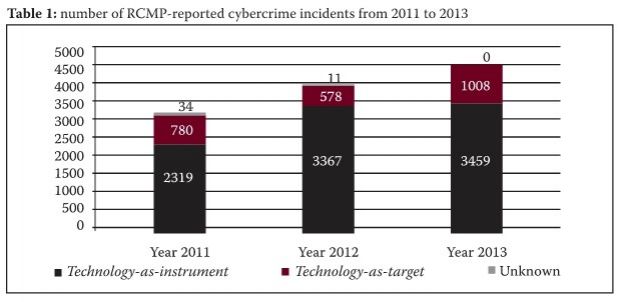The Royal Canadian Mounted Police (RCMP) announced yesterday its Cybercrime Strategy plan, a long-term program to deal with the rising wave of cyber-crime affecting the country's residents.
From 2011 to 2013, Canada has seen a 40% rise in cyber-crime incidents, growing from over 1,300 incidents reported in 2011, to more than 4,400 cases in 2013. Most of these incidents involved technology-as-instrument offences, but there were also many incidents involving technology-as-target.
This rise in cyber-crime and cyber-threats, along with the presence of similar cyber-crime fighting units in other friendly or adversary countries, have convinced high-ranked Canadian police officials it is time to set up their own hacking division to fight online crime, and cooperate with similar agencies abroad.
To get things off the ground, the Canadian government has allocated 30 million CAD (22.5 million USD / 20.5 million EUR) for a five-year plan that will end in 2020, when the cyber-crime fighting unit is expected to be fully-operational.
With the financial backing assured, the RCMP is now looking for at least 40 IT professionals to form its new cyber-crime-fighting department.
RCMP will now fight hackers, fraudsters, scammers, and... Anonymous
Besides fighting online threats in the forms of fraudsters, online scammers, and identity thieves, the new unit will also have the pleasure to deal with Anonymous that, just two months ago, hacked Canadian government servers and stole some semi-important documents.
Of course, hacktivists like Anonymous are more of a nuisance these days, and RCMP's new division will surely have to spend more time dealing with individuals that target private companies to steal economic and trade secrets, or breach government servers in cyber-espionage campaigns.
In recent years, Canada has seen some serious cyber-attacks, like the Ashley Madison data breach that dumped online the personal details of over 30 million users, and the attack on one of Ottawa's top scientific research agencies in 2014.
"Cybercrime impacts Canada and Canadians in many ways, from Internet scams to attacks on government, financial and private-sector networks," said Commissioner Bob Paulson. "The Cybercrime Strategy presents the RCMP's plan to work collaboratively with its partners to help improve the safety and security of our country and its citizens online."
The RCMP has made its 15-point Cybercrime Strategy plan available online [PDF].

 14 DAY TRIAL //
14 DAY TRIAL // 

